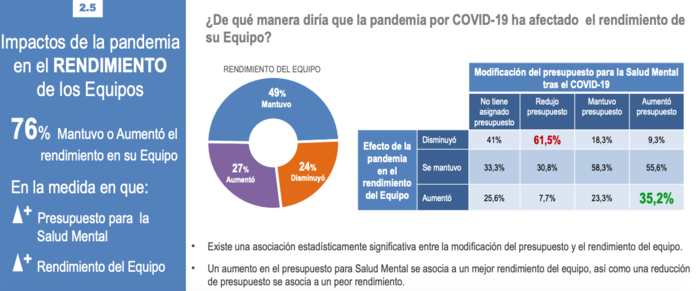Since 1998, Chile Unido Foundation supports the transformation of public and private entities in terms of work-life balance. With this objective in mind, it developed the Programme for Work-Life balance, that provides capacity building and advice to companies and public entities on good practices about employee’s welfare and quality of life.
The Study “Good labour practices for mental health in times of Covid-19” was elaborated based on a survey of 186 organisations, of which 80% private and 20% public entities.
It considered whether the resources dedicated to mental health had increased: among the 73% that has a budget line for mental health, 30% increased their expenditure.
The list of major concerns related to Covid-19 pandemic is headed by anxiety on the situation and anxiety over the situation of the company, followed by the difficulty to work from home.
Among the means to improve mental health used during the pandemic, the flexibilization of working time to adapt it to family needs was implemented by 85% of the organisations surveyed.
Further activities were in place during the pandemic, such as psychological support, capacity building for wellbeing and mental health, leisure virtual activities for employees and their families, training for managers on working from remote, economic support, preventative measures for health and safety.
The Study outlined that advanced mental health support practices had a positive impact on productivity, especially in the cases of an increased expenditure for mental health support.

It showed, indeed, that on the organisations that have been increasing their budget for mental health only 9.3% decreased productivity, while 35.2% improved it.
An improved productivity rate was found for those organisations that have established a special communication channel to address employees’ requests (39%), surveys to check on their employees (39%), and practical advices on how to handle stress and anxiety (36%).
The study concludes with some recommendations on how to take care of mental health and employees wellbeing, in general terms, at an organisational level and during telework.